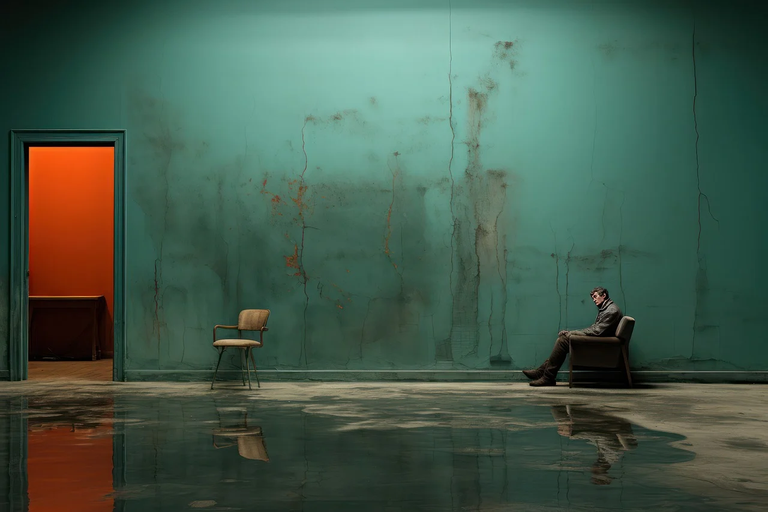
Daily conversations

Today I'll sign the contract I've told you so much about, father, and I hope I can do my job well. I will follow your advice. You know, I have done my best. I'm sure the clients will be satisfied and I'll be happy," I tell him smiling as I drive to work.
When I get home, I talk to him too:
─Today was a great day. They congratulated me at the company. I think I'm going to make partner soon," I say proudly, and I go on telling him everything I've done during the day until sleep overcomes me.
But it wasn't always like that. There was a time when I spoke little to my father, especially after my mother died and it was just the two of us in the house.
At that time, the house became a battlefield where a cold and silent battle was fought daily between my father and me:
─Breakfast is ready, Fernando! -my father announced excitedly, standing in the doorway of my room. I barely raised my head, as my father returned to the kitchen, humming an old song, where he was waiting for me to have breakfast. With genuine interest, my father tried to engage me in conversation:
How did you sleep? -Did you see that there's a baseball game today? If you want, we can make some sandwiches and enjoy the game together. Do you think so? -my father asked.
No. I have a lot of maths homework," I answered without looking up from my plate of breakfast, which I savoured slowly and reluctantly. It was hard to meet my father's eyes and hide all the feelings that surfaced at his animated attitude.
Well, I can also help you with your homework, Fernando. I haven't brushed up on my maths for a while! -my father replied with an almost childlike enthusiasm.
And it was that enthusiasm, that passion with which my father spoke and did things, that bothered me most about him: how could he have that joy after the death of my mother, his wife, how could he maintain that youthful exaltation when the house was no longer the same without the presence of that woman who had given everything for us? How, precisely, after my mother's death, had he become a jubilant and strident man?

My father called me to share with them and I turned a deaf ear. So much so that when he went to look for me in my room, he found the door closed and although he called me several times, he only got my silence. My words were full of mourning, sadness and anger.
The next day I did not speak to him. Nor did I speak to him the following days. That cold indifference to his presence was enough for my father to understand, and accept, my grief and never bring his friends home anymore. I felt undefeated in that confrontation, as undefeated was the memory of my mother that I thought I was defending from the festivity of life.
Then the house full of maternal traces, of old photos, became a tree without branches or fruit where the birds never again landed. Only my father's smile was not banished from that place full of night, memories and sadness that he and I inhabited, in a ghostly way, as if inhabiting had nothing to do with sharing or coinciding, but with remaining in spite of absence.

I will celebrate your success and achievements, Fernando. I always will. If your mother were alive, she would have celebrated too. The three of us would have celebrated this moment. -I tried to leave, but my father's enthusiastic tone disappeared and I preferred to stay. He continued:
─Fernando, do you remember your mother's laughter? -my father asked me and as always I didn't say a word, but this time I raised my head and looked at my father's eyes: they looked like a well full of water about to overflow.
I do remember her, Fernando. Your mother smiled with her soul. She was always happy. But me, Fernando, so grey, so full of darkness. That's why your mother made me promise to smile at you every day, son. Beyond you and me, I had to teach you that life is beautiful and you have to live it. Because you know, son, you only live once and once is enough when you really live it.
That day was the first time we stayed up talking past dawn. Then I went off to university and although at a distance, I began to get into the habit of telling him my stories on a daily basis. A habit I still have today, despite his death.

The images are from Pixabay and the text is my own, translated on Deepl.


Thank you for reading and commenting, my friend. See you next time.
Click here to read in spanish
Conversaciones diarias
Todos los días converso con mi padre. No hago nada sin consultarle previamente a él.
─Hoy firmaré el contrato del que tanto te he hablado, padre, y espero poder hacer bien mi trabajo. Seguiré tus consejos. ¿Sabes? He puesto lo mejor de mí. Seguramente los clientes quedarán satisfechos y yo estaré dichoso –le digo sonriente mientras voy en el carro rumbo al trabajo.
Cuando llego a casa, también le hablo:
─Hoy fue un día estupendo. En la empresa me felicitaron. Creo que pronto lograré ser socio –expreso lleno de orgullo y sigo contándole todo lo que he hecho en el día hasta que el sueño me vence.
Pero no siempre fue así. Hubo una época en la que hablaba poco con mi padre, especialmente después que mi madre murió y quedamos los dos solos en la casa.
En aquella época, la casa se convirtió en un campo de guerra en el que se libraba, diariamente, una fría y silenciosa batalla entre mi padre y yo:
─¡El desayuno está listo, Fernando! –anunciaba exaltado mi padre parado en la puerta de mi habitación. Yo apenas levantaba la cabeza, mientras mi padre volvía a la cocina, tarareando una vieja canción, y en donde me esperaba para desayunar. Con verdadero interés, mi padre intentaba entablar una conversación conmigo:
─¿Cómo dormiste? –era la pregunta más frecuente- ¿Viste que hoy hay juego de beisbol? Si quieres, podemos hacer unos emparedados y disfrutamos del juego, juntos. ¿Te parece? –interrogaba mi padre.
─No. Tengo mucha tarea de matemáticas –respondía sin levantar el rostro del plato con un desayuno que saboreaba con desgano y lentitud. Se me hacía difícil verle los ojos a mi padre y ocultar todos los sentimientos que afloraban ante su animada actitud.
─¡Bueno, también te puedo ayudar con las tareas, Fernando. Tengo rato que no repaso mis conocimientos matemáticos! –respondía mi padre con un entusiasmo casi infantil.
Y es que era aquel entusiasmo, aquella pasión con la que mi padre hablaba y hacía las cosas, lo que más me molestaba de él. ¡¿Cómo podía tener aquella alegría después de la muerte de mi madre, su esposa?! ¿Cómo lograba mantener aquella exaltación juvenil si la casa ya no era la misma sin la presencia de aquella mujer que había dado todo por nosotros? ¿Cómo, justamente, después de la muerte de mi madre, él se había convertido en un hombre jubiloso y estridente?
Recuerdo la primera vez que mi padre se reunió con sus amigos en la terraza de la casa, un año después del fallecimiento de mi madre. Las risas, la música, eran un puñal afilado que rompía mi pecho y lo hacía trizas.
Mi padre me llamó para que compartiera con ellos y yo me hice el sordo. Tanto así que cuando fue a buscarme a mi habitación, encontró cerrada la puerta y aunque me llamó varias veces, solo obtuvo mi silencio. Mis palabras estaban llenas de luto, de tristeza y rabia.
Al día siguiente no le dirigí la palabra. Tampoco le hablé los días siguientes. Esa fría indiferencia ante su presencia fue suficiente para que mi padre entendiera, y aceptara, mi duelo y ya más nunca llevara a sus amigos a casa. Me sentí invicto en aquel enfrentamiento, como invicto estaba el recuerdo de mi madre que yo creía defender de la festividad de la vida.
Entonces la casa llena de huellas maternas, de fotos antiguas, se convirtió en un árbol sin ramas ni frutos donde más nunca se posaron los pájaros. Solo la sonrisa de mi padre no fue desterrada de aquel lugar cargado de noche, recuerdos y tristezas que habitábamos él y yo, de manera fantasmal, como si habitar no tuviera que ver con compartir ni coincidir, sino con permanecer a pesar de la ausencia.
El tiempo pasó, específicamente dos años desde la muerte de mi madre, cuando terminé el liceo e hice mi inscripción universitaria. Mi decisión había sido irme a estudiar lejos, para así desligarme de la presencia paternal que me saturaba con su alegría permanente y sofocante. Papá había querido hacer un pequeño brindis en casa, pero yo había respondido con un no rotundo. Mi padre, con la mejor actitud, me dijo:
─Yo sí voy a celebrar tu éxito y tus logros, Fernando. Siempre lo haré. Si tu madre estuviera viva, también habría celebrado. Los tres habríamos celebrado este momento. –yo intenté irme, pero el tono entusiasta de mi padre desapareció y preferí quedarme. Él continuó:
─¿Fernando, tú recuerdas la risa de tu madre? –me preguntó mi padre y como siempre no pronuncié palabras, pero esta vez alcé la cabeza y miré los ojos de mi padre: parecían un pozo lleno de agua a punto de desbordarse.
─Yo sí la recuerdo, Fernando. Tu madre sonreía con el alma. Siempre estaba feliz. En cambio yo, Fernando, tan gris, tan lleno de oscuridades. Por eso tu madre me hizo prometerle que diariamente debía sonreírte, hijo. Más allá de ti y de mí, debía enseñarte que la vida es bella y hay que vivirla. Porque sabes, hijo, solo se vive una vez y una vez es suficiente cuando se vive de verdad.
Aquel día fue la primera vez que nos quedamos hablando más allá de la madrugada. Luego me fui a la universidad y aunque a distancia, comencé a crear la costumbre de contarle mis cosas diariamente. Costumbre que aún conservo hoy, a pesar de su muerte.
The importance of communication, understanding, and acceptance in familial relationships can't be overstated.
Although the son initially struggles to connect with his father, feeling a mix of grief, sadness, and anger, it's beautiful that over time, the father's persistent joy and enthusiasm help the son see the beauty in life and eventually strengthen their bond.
I believe that life is a gift and therefore we should know how to appreciate it. Who despises a gift? No one! The best way to appreciate life is to live it every day. Greetings
Fernando misunderstood his father's behaviour toward him after his mother's death and little did he know that the old man was only fulfilling a promise he made. It's good Fernando realised why his father had been acting like nothing happened.
This is a touching and emotional one...
Sometimes we judge others for who we are, without understanding that people are different and have different ways of dealing with feelings. Thank you for commenting. Regards
This left me feeling both sad and happy at the same time. It's not easy moving on after the loss of a loved one but then you can't mourn forever but when you have a life to live. I'm glad she recognised her father wasn't doing any wrong and restored the relationship they once shared.
Grief is a feeling that takes time. Some of us get over the loss, but some of us do not. However, permanent suffering cannot be an option. We must go on, despite the sadness. Greetings
Your last line says it all.
The death of a loved one marks our lives to the point of making them change completely, after that we are no longer the same. A touching story of father and son.
Thanks for sharing your story.
Happy day.
Exactly. Anyone who has suffered the death of a loved one, especially a parent, will never be the same again. A part of him or her dies with the other. Greetings and have a nice day
This story should have a cautionary note in the title: Beware of broken hearts. For, when the reader reads the last words, there may be broken hearts.
This is a beautiful story. It manages the almost impossible task of bringing tears to the reader's eyes, and yet the narrative itself is not maudlin and does not engage in such theatrics.
The mother and father in this piece live on after death, as we all hope we might one day, in the hearts and minds of those we loved.
Thank you for sharing the wonderful story with us, @nancybriti1.
Thanks to you for allowing me the opportunity to "drain", in one way or another, through writing, my feelings. Greetings and thanks again
This is a nicely crafted story of how family relationships evolve in the face of death and individual growth. Our conceptions of each other certainly change with time, which is a good reason to remind ourselves that we do indeed only live once (unless you believe in reincarnation ;) Well done!
Hey, the idea of reincarnation would have been an interesting idea to develop into a story. Thanks, my friend and best regards